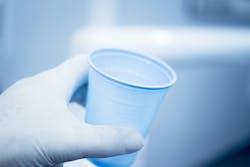Can a mouthwash-based test help predict head and neck cancer recurrence?
What if a mouthwash-based test to detect biomarkers can help physicians predict disease recurrence in head and neck cancer patients?
That scenario seems closer to reality after a new study by researchers at Sylvester Comprehensive Cancer Center at the University of Miami Miller School of Medicine, UC San Diego Health and collaborating cancer centers.
Their findings, published August 15 in the peer-reviewed journal JAMA Otolaryngology – Head & Neck Surgery, could improve how physicians predict and detect recurrence with these cancers.
Previously, Elizabeth Franzmann, MD and her team had studied how biomarkers in oral rinses can assess a person’s risk for developing oral or oropharyngeal tumors, the most common types of head and neck cancers. They found a link with two key biomarkers – CD44, a tumor-initiating molecule, and total protein levels.
In this new study, the researchers studied whether those two biomarkers could predict recurrence in already-diagnosed patients. Their clinical trial evaluated the effects of CD44 and total protein levels in 160-plus patients across multiple cancer centers. Patients were provided oral-rinse samples for use up to 18 months after their initial treatment.
To measure biomarker presence, the researchers used laboratory tests and experimental lateral-flow tests, technology similar to stick-based pregnancy and COVID-19 tests.
“Our laboratory assays showed an association between biomarker levels and later recurrence,” Franzmann said. “Compared to patients with normal protein levels three months after treatment, patients with about twice as much total protein had an estimated 65% greater risk of recurrence.”
She added that patients with CD44 levels that were triple the normal level had an estimated 62% percent greater recurrence risk.
The study also generated early data on a rapid, point-of-care test to measure these biomarkers, with the findings expected to help hasten its development.

